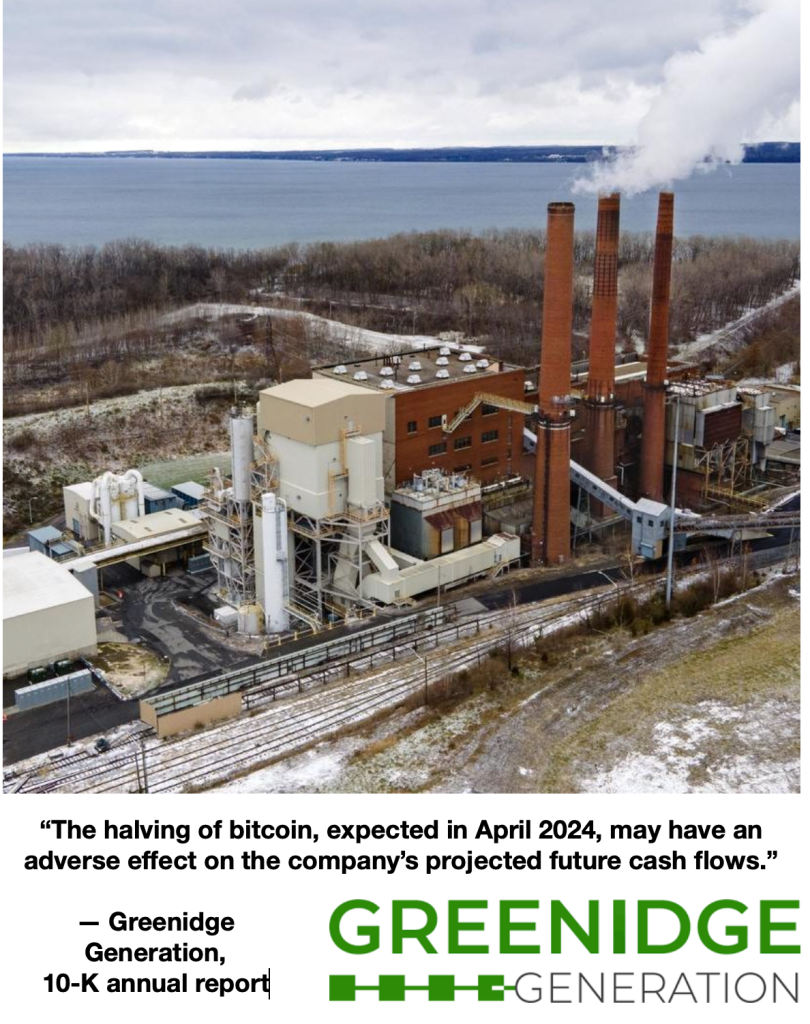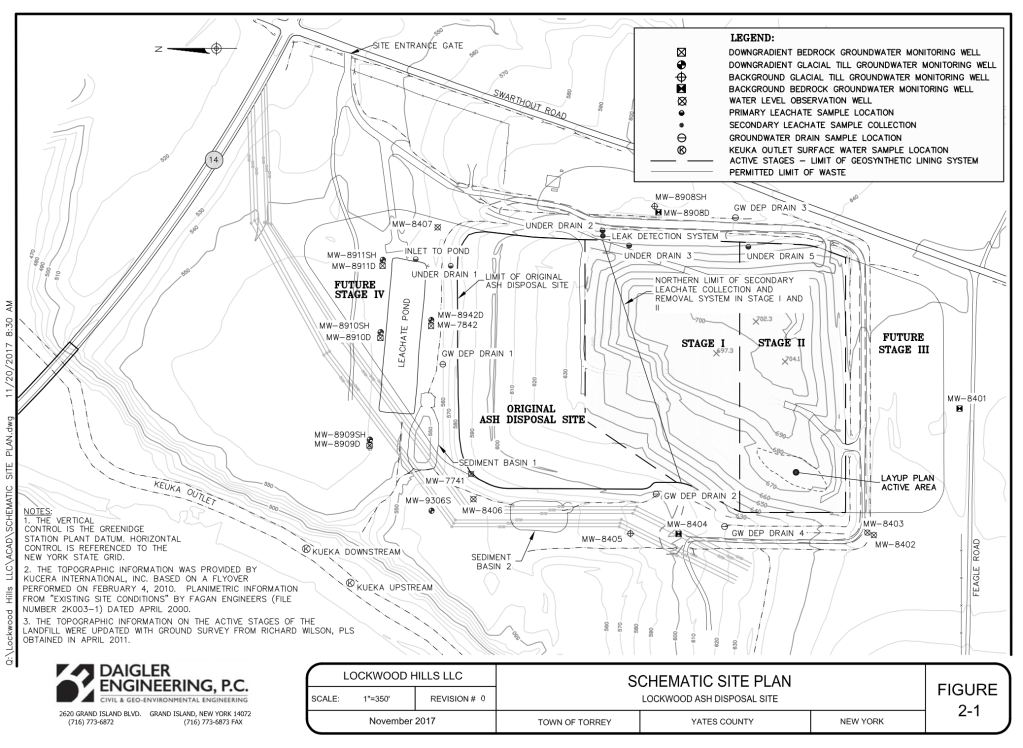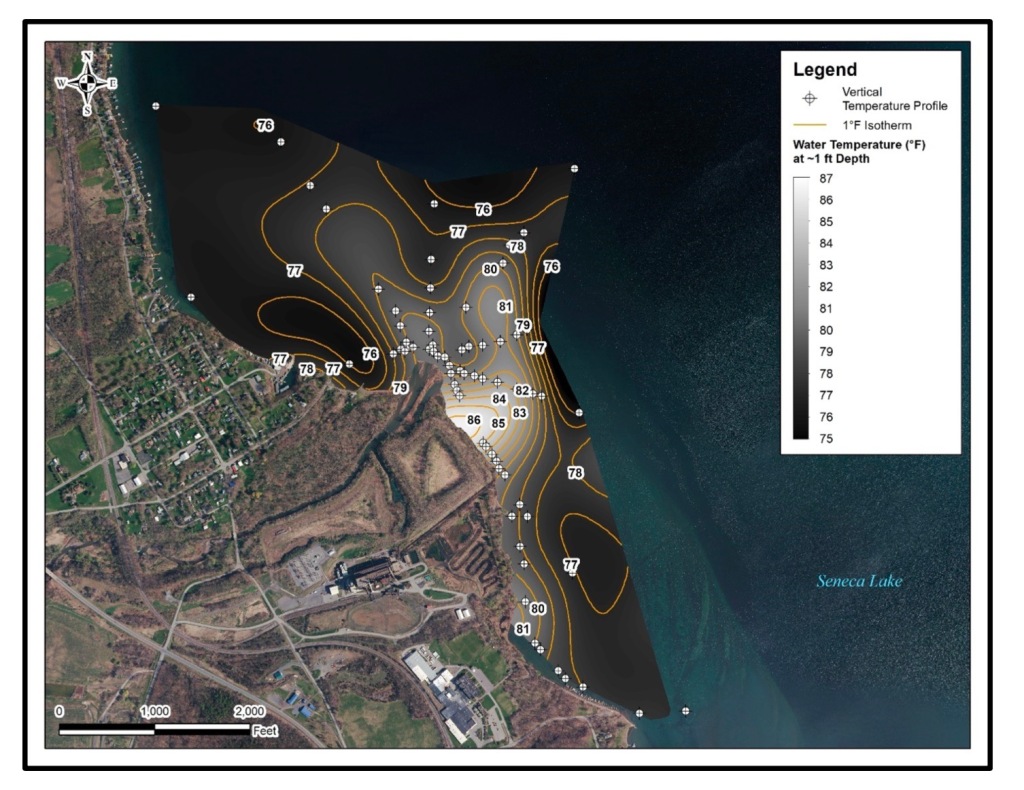DRESDEN, Apr. 19, 2024 — Shares of Greenidge Generation Holdings LLC common stock have lost 30 percent of their value since the April 9 release of the company’s annual report, which warned investors about its precarious finances and costly environmental liabilities.

“The company has historically incurred operating losses and negative cash flow from operations,” Greenidge said in its 10-K filing with the Securities and Exchange Commission. “These factors raise substantial doubt as to the company’s ability to continue as a going concern.”
The Bitcoin mining company held $13.3 million in cash at the end of 2023 and estimated it would run out of cash in early 2025 unless it raised additional capital by issuing new stock or selling assets.
The company noted that its prospects for positive cash flow depend largely on the market price of Bitcoin and natural gas, which both improved in 2023 and 2024 but remain volatile. The price of Bitcoin (BTX) has surged from $16,529 to $63,438 since the beginning of 2023.
But Greenidge has failed to capitalize on that spectacular run-up, as the company’s share price fell during that same period. So far in 2024, the price of Bitcoin has climbed 43 percent, while Greenidge’s stock (GREE) had fallen 64 percent as of Thursday’s close at $2.46.
Now Greenidge is about to face a new challenge.
Imminent Bitcoin ‘Halving’ May Hurt Revenue
Within a day or two — probably Saturday — the bitcoin mining world will shift dramatically when the total number of bitcoin that miners compete for will be cut in half. Today miners worldwide compete for 6.25 bitcoin issued every 10 minutes. After the halving, only 3.125 will be available each 10 minutes.
“Bitcoin Halving” occurs roughly every four years, as set in the digital currency’s original programming code that was written to create scarcity over time. Back in 2009, miners were competing for 50 bitcoin every 10 minutes. But successive halvings have trimmed those rewards.

“The halving of bitcoin, expected in April 2024, may have an adverse effect on the company’s projected future cash flows,” the 10-K annual statement said.
Aside from bitcoin price and supply variables, Greenidge also faces a heavy debt burden due to its aggressive debt-financed purchases of bitcoin mining machines during 2021 and 2022. (Bitcoin lost 75 percent of its value between November 2021 and December 2022).
Greenidge now faces $6.1 million in interest payments due over the next twelve months, according to its 10-K report.
Those debt payments would have been far higher if the company hadn’t restructured much of its long-term debt in 2023. In November, it sold its 44-megawatt bitcoin mining operation in South Carolina to its primary lender, NYDIG. Earlier in the year, Greenidge sold the majority of its mining machines in Dresden to NYDIG. Most proceeds went to reduce long-term debt.
The mining machines are special-purpose computers that race other miners to find solutions to complex puzzles. The winners earn bitcoin. The company’s Dresden plant powers the NYDIG miners as well as the machines Greenidge retained.
For the year 2023, Greenidge reported earning total revenue of $70.4 million, including $39.5 million from hosting the NYDIG machines and $24.2 million from mining with its own.

In the first quarter, ending March 31, reported revenues were $19.6 million, including $10.7 million from hosting and $7.2 million from the Greenidge miners. “We are excited about the opportunities ahead…,“CEO Jordan Kovler said in a press release April 10.
In the first quarter the company secured access to 60 megawatts of power in South Carolina for development of a data center, bought site in Mississippi with 32.5 MW of mining capacity and leased a site in North Dakota with 7.5 MW of mining capacity, the release reported.
In December, Greenidge had announced the launch a new service offering, GreenidgeAI, through a partership with Infinite Reality Inc.
“Entering the AI datacenter space has been a strategic focus of ours and, as such, we have been thoughtful in our search for the right long-term partner,” Kovler said in December.
Environmental Controversies Start Early
The 2014 acquisition of a former coal-fired power plant on the shores of Seneca Lake stirred controversy from to moment it was announced by Atlas Holdings LLC, a Connecticut-based private equity group.
The plant was converted to burn natural gas in 2017, and its bitcoin mining operations ramped up in 2019-2020.
In September 2021, Greenidge acquired Support.com, a publicly traded company, as a means of “going public” to raise money by selling common shares. Since then, those shares have performed abysmally, losing more than 99 percent of their value.
Although Greenidge’s common shares have been trading on the NASDAQ market, Atlas Holdings has retained control of the company. According to the 10-K, Atlas and its affiliates controlled 78 percent of the voting power as of yearend 2023.


Atlas and its two founders, Andrew Bursky and Timothy Fazio, contributed more than $100,000 to Gov. Andrew Cuomo’s reelection campaign and lobbied top administration officials in March 2015 for a state permit to restart the plant.
Later in 2015, the Cuomo Administration waived an environmental impact statement for the restart and awarded Greenidge a $2 million taxpayer-funded grant.
Cuomo’s state Department of Environmental Conservation waived the EIS despite the fact that Greenidge owned an unlined and unremediated coal ash landfill. It granted the restart permit even though the company lacked current water withdraw and discharge permits.
In a February 2015 consent agreement with the DEC, Greenidge had committed to clean up its Lockwood Hills landfill by October 2016. But the agency repeatedly pushed back that deadline to remove and dispose of all toxic leachate from a pond that was leaking heavy metals into the groundwater.

The U.S. Environmental Protection Agency raised alarms in early 2016, opposing the DEC’s planned renewal of a discharge permit in light of water quality violations and new federal rules for coal ash residuals.
This January, the EPA fined Greenidge $105,000 in its first-ever enforcement action under the agency’s national initiative to cleanup coal ash sites. A 2024 consent agreement signed by the agency and the company alleged that Greenidge failed to properly monitor the site, and it imposed new deadlines to close its coal ash pond.
Liabilities of $30.2 million for Coal Ash Pond, Lockwood Hills Landfill
Greenidge did not admit fault. Although the company never burned coal or added new coal ash to the pond, it acknowledged routing the plant’s wastewater and stormwater through it.

“The pond has been a blight on our community since before I was born, and the successful operation we’ve built here is the reason it is being removed,” Greenidge President Dale Irwin said in January.
“If we didn’t make the investment to build and grow our company in Yates County — despite the objections of some — the coal ash pond from previous ownership would literally just continue to sit there, as there would be no one to fund the cleanup,” Irwin added. “Greenidge is part of this region’s future, and we take real pride in working to eliminate this dirty relic of the past.”
Almost a decade earlier, Irwin signed the DEC consent agreement requiring a complete cleanup by October 2016.
Greenidge’s 10-K annual report states that the EPA has required the company to close the coal ash pond by November 2028, and it lists that site as a $17.3 million liability.

Greenidge’s Lockwood Hills landfill, which serves as a leachate treatment facility, is listed as a separate $12.9 million liability in the 10-K.
Meanwhile, Greenidge’s intake of coolant water from Seneca Lake and discharges of warmed water into the Keuka Outlet have also been controversial.
Although the federal Clean Water Act requires intake pipes to have fish screens to protect aquatic life, the DEC allowed Greenidge to restart without them and allowed the plant five years to install them. The installation was completed last year.
The coolant waters discharged into the Keuka flow immediately into Seneca Lake, warming sections of the lake beyond the 3 degrees allowed under state regulations. Artificially warmed waters are also considered a pollutant under the Clean Water Act.

The state issued a waiver for the warm water violations in 2017 and administratively renewed it in 2022, the DEC said in a statement to WaterFront April 17.
Three environmental groups filed suit in federal court last year alleging that Greenidge’s warm water discharges violated federal law. But a federal judge rejected the claim on the grounds that the EPA had delegated authority to regulate plant discharges to the DEC and that DEC rules must prevail.
Finally, the Dresden power plant’s air emissions have been found to violate the state’s 2019 climate law, the Climate Leadership and Community Protection Act.

In Jun 2022, the DEC denied the plant’s application to renew its Title V air emissions permit on the grounds that its emissions violated CLCPA.
The company has appealed the ruling within the DEC in an administrative proceeding. The agency said that a DEC administrative law judge is reviewing appeals to determine whether any issues need to be adjudicated.
Greenidge’s 10-K annual report said: “No further adjudicatory proceedings have been scheduled to date and we expect that the (air emissions) appeals process may take a number of years to fully resolve.”
During that open-ended process, Greenidge has been allowed to operate the plant without restriction as if it hadn’t been found to be in violation of CLCPA.


Peter, Great article….I admire the comprehensiveness of your coverage of the issues associated with the plant. John V. Dennis
LikeLike